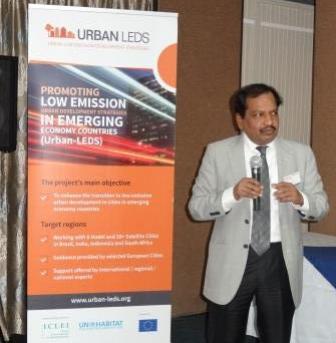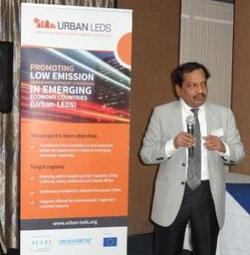Anchoring ideas at Urban LEDS First City-peer exchange and learning on Low Emission Development

Thane, Rajkot, Shimla and Gwalior were among the seventeen of the thirty-seven Urban LEDS project cities that came together at the First City-peer exchange and learning on Low Emission Development on 27 to 29th November, 2013 in Nelson Mandela Bay (NMB), South Africa. The International City Networking Seminar, which is the first networking seminar in the framework of the Promoting Low Emission Urban Development Strategies in Emerging Economy Countries (URBAN-LEDS) project, witnessed a reputable line-up of political and administrative representatives from Urban LEDS project cities from Brazil, India, Indonesia and Europe ,who came together to connect, exchange and explore ideas. Political leaders and technical staff learned from experts and one another, exploring urban low emission development, energy security, climate change and the challenges they face. This peer exchange launched the informal twinning between cities and people in the project to foster peer-learning and knowledge exchange.
The particular focus was on jointly finding ways to optimize governance systems and structures and looking at integration for specific tasks. The City-peer exchange, which saw the participation of representatives from UN-Habitat, World Bank, Manchester University, CSIR Built Environment, KMW – Republic of Korea, representatives from GIZ, National government of South Africa, ICLEI World Secretariat and other ICLEI Regional offices including ICLEI South Asia, laid special emphasis upon exploring how to develop vertically integrated NAMAs – Nationally Appropriate Mitigation Actions (V-NAMAs), which will enable local governments to tap into financing mechanisms available for emerging economies and developing countries. ICLEI will support the project cities by helping them identify priority LED projects, promote knowledge sharing and provide the necessary tools and materials to adopt the Green Climate Cities (GCC) methodology, a methodological framework developed by ICLEI to promote Urban LEDS.
Ms. Boliya Raghubhai, Mayor of Rajkot, India, outlined the focus clearly, “One of the key priorities for us is energy efficiency in street lighting, and presently under Urban LEDS we are planning to develop a Street lighting policy for phase-wise implementation of LED Street lights in each of the three zones of RMC. I am Thankful to ICLEI, UN-Habitat & European Commission for giving us this opportunity to participate in this workshop and guiding us on the path of Low carbon development."
This reality is addressed in the Urban-LEDS project where cooperation between different levels of government (vertical) and same levels of local government (horizontal) is explored. Networking and peer exchange are essential elements when addressing local climate action. Every city, every local government has its own unique context, yet there are also many similarities and a lot of existing guidance and knowledge.
Also, Indian cities, Thane and Rajkot displayed their initiatives undertaken as part of the programme. Under the Ministry of New and Renewable Energy’s (MNRE) Solar City Program, the cities of Thane and Rajkot have set a target to replace 10% of conventional energy by Renewable Energy (RE) and Energy Efficiency (EE) activities. Both Model Cities, Thane and Rajkot have taken commendable measures for low carbon strategies such as energy efficiency in Municipal street lighting, usage of star labeled appliances, installation of solar street lights, Bus Rapid Transit Systems (BRTS) and installation of a Solar Energy Park (Solar cell) in the city, to spread awareness on low carbon technologies among the general public.
Shimla Municipal Corporation plans to adopt a tramway and a biomethanation system, while Gwalior Municipal Corporation is looking at Solar PV projects.
Each Model City came up with the possibilities of urban/spatial planning in the Urban LEDS process in their Cities. Each city proposal will be further developed and submitted to UN-Habitat for approval; the selected projects will be supported by UN-Habitat through co-funding and technical support.
The next exchange opportunity will take place in April 2014 at ICLEI´s Global Town Hall at Metropolitan Solutions in Hannover (Germany) from 7 – 11 April 2014.
For further information, click here.




